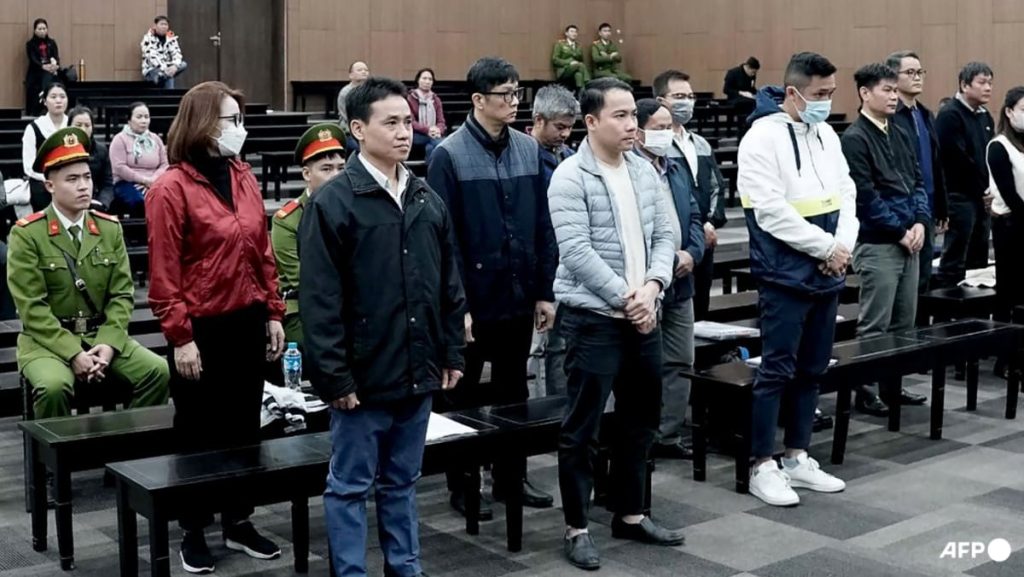The ongoing trial in Hanoi, Vietnam, underscores the nation’s unwavering commitment to eradicating corruption, particularly within the context of its COVID-19 pandemic response. Seventeen officials and businesspeople stand accused of bribery, abuse of power, and concealing criminal activities related to repatriation flights during the height of the pandemic. This trial follows a previous wave of convictions last year, where 54 individuals were found guilty of accepting and offering bribes totaling US$9.5 million, highlighting the pervasive nature of the corruption scheme. The ongoing proceedings are expected to continue for approximately a week, as the court meticulously examines the evidence and testimonies presented.
The charges revolve around the alleged exploitation of vulnerable citizens seeking to return to Vietnam during the early stages of the pandemic. With borders largely closed, the process of repatriation was fraught with complexities, including stringent entry procedures, exorbitant flight costs, and mandatory quarantine fees. This created a breeding ground for corruption, as officials allegedly leveraged their positions to expedite the process in exchange for bribes. The accused, including officials from the transport ministry, provincial administrations, and travel companies, are suspected of facilitating access to limited flight seats for personal gain. One defendant, a former provincial official, confessed to accepting approximately US$300,000 in bribes and commissions for organizing quarantine facilities, admitting to exploiting the situation for financial benefit.
The repatriation flight scandal represents a significant chapter in Vietnam’s ongoing anti-corruption campaign. The government’s determination to expose and punish those involved is evident in the high-profile nature of the cases and the severity of the sentences handed down in the previous trial. Four senior officials from the ministries of foreign affairs, health, and public security received life sentences, a testament to the government’s resolve to hold accountable those who abused their power during the crisis. This resolute stance signifies a broader effort to address systemic corruption within the country’s administrative and political landscape.
This anti-corruption drive has already led to significant political upheaval, demonstrating the far-reaching consequences of these investigations. Notably, former President Nguyen Xuan Phuc resigned, accepting political responsibility for the misconduct of officials under his purview. Furthermore, two deputy prime ministers, including the former foreign affairs minister and the official who oversaw the nation’s COVID-19 response, were removed from their positions by the National Assembly. These high-level resignations and dismissals underscore the government’s commitment to transparency and accountability, sending a clear message that corruption will not be tolerated, regardless of an individual’s political standing.
The backdrop of the repatriation flight scandal paints a stark picture of the difficulties faced by Vietnamese citizens abroad during the pandemic. With limited flight options and complex procedures, individuals desperate to return home were often left with little choice but to navigate a system rife with corruption. One poignant example illustrates the exorbitant costs incurred by families seeking to reunite with their loved ones: a mother in Hanoi reportedly spent over US$10,000 to secure her daughter’s return from a European boarding school. This instance highlights the financial strain placed on families and the exploitative nature of the corruption that permeated the repatriation process.
The ongoing trial and the preceding convictions symbolize a critical juncture in Vietnam’s fight against corruption. The government’s unwavering commitment to uncovering and prosecuting those responsible for exploiting the pandemic for personal gain sends a powerful message of deterrence. The implications of this anti-corruption campaign extend beyond individual cases, aiming to address systemic issues and foster greater transparency and accountability within the government. The trials serve as a reminder of the importance of ethical conduct, especially during times of crisis, and the need for robust mechanisms to prevent the abuse of power. The outcome of this trial and the subsequent actions taken by the government will be crucial in shaping the future trajectory of Vietnam’s anti-corruption efforts and restoring public trust.

